
Charles Mingus Jr. was an American jazz upright bassist, pianist, composer, bandleader, and author. A major proponent of collective improvisation, he is considered to be one of the greatest jazz musicians and composers in history, with a career spanning three decades and collaborations with other jazz musicians such as Louis Armstrong, Duke Ellington, Charlie Parker, Dizzy Gillespie, and Herbie Hancock.

Eric Allan Dolphy Jr. was an American jazz alto saxophonist, bass clarinetist and flautist. On a few occasions, he also played the clarinet and piccolo. Dolphy was one of several multi-instrumentalists to gain prominence in the same era. His use of the bass clarinet helped to establish the instrument within jazz. Dolphy extended the vocabulary and boundaries of the alto saxophone, and was among the earliest significant jazz flute soloists.
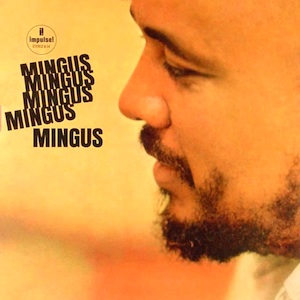
Mingus Mingus Mingus Mingus Mingus is a studio album by the American jazz composer and bassist Charles Mingus which was released on January 9, 1964.
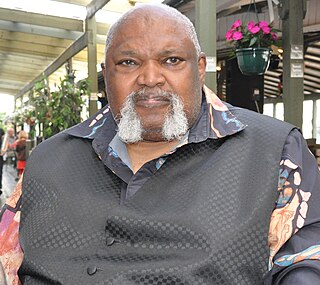
Theodore Curson was an American jazz trumpeter.
"Fables of Faubus" is a composition written by jazz double bassist and composer Charles Mingus. One of Mingus's most explicitly political works, the song was written as a direct protest against Arkansas governor Orval Faubus, who in 1957 sent out the National Guard to prevent the racial integration of Little Rock Central High School by nine African American teenagers, in what became known as the Little Rock Crisis.
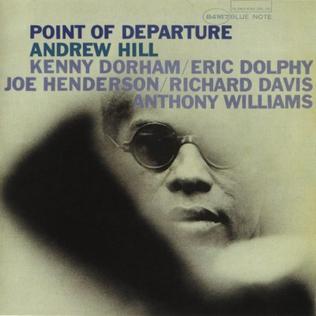
Point of Departure is a studio album by American jazz pianist and composer Andrew Hill, recorded in 1964 and released in 1965 on the Blue Note label. It features Hill in a sextet with alto saxophonist Eric Dolphy, tenor saxophonist Joe Henderson, trumpeter Kenny Dorham, bassist Richard Davis and drummer Tony Williams.

Mingus at Antibes was originally issued by BYG Records under the title Charles Mingus Live With Eric Dolphy in Japan in 1974. It was recorded at a live 1960 performance at the Jazz à Juan festival at Juan-les-Pins by jazz bassist and composer Charles Mingus; and was re-released by Atlantic Records in more complete form as a double album with the title Mingus In Antibes in the United States in 1976.

Astral Weeks is an unauthorized bootleg album of Charles Mingus' music, released by Moon Records in Italy on vinyl and CD in 1990. The material was recorded live in Copenhagen, on April 14, 1964, during Mingus's European tour that month and The European Tour.</ref>

Reincarnation of a Lovebird is a studio album by the American jazz bassist and composer Charles Mingus, recorded in November 1960.
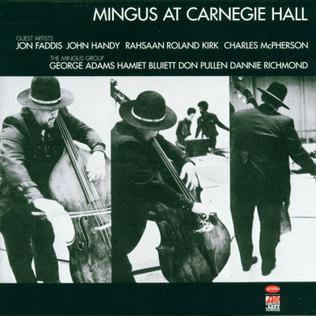
Mingus at Carnegie Hall is a live album by the jazz bassist and composer Charles Mingus, recorded at Carnegie Hall in January 1974 by Mingus with Jon Faddis, Charles McPherson, John Handy, George Adams, Rahsaan Roland Kirk, Hamiet Bluiett, Don Pullen, and Dannie Richmond. The original release did not include the first part of the concert, featuring Mingus’s working sextet without Handy, Kirk, and McPherson. An expanded “Deluxe Edition” including the entire concert, was issued in 2021.

Cornell 1964 is a live album by the Charles Mingus Sextet, featuring multi-instrumentalist Eric Dolphy. It was recorded at Cornell University in Ithaca, New York, on March 18, 1964.

The Great Concert of Charles Mingus is a live album by the jazz bassist and composer Charles Mingus, recorded at the Théâtre des Champs-Élysées, Paris, France, on April 19, 1964. It was originally released as a triple album in 1971 on the French America label. The album was recorded just two days after the live sessions that produced Revenge!, which was also recorded live in Paris.

Town Hall Concert is a 1964 live album by the jazz bassist and composer Charles Mingus. It was recorded in New York City at The Town Hall on April 4, 1964. "So Long Eric" is a 12-bar blues that got its name after Eric Dolphy informed Mingus he would be leaving the band to stay in Europe before a concert in Oslo. "Praying With Eric" is more commonly known as "Meditations On Integration". The album was originally released on Mingus' own Jazz Workshop label and subsequently rereleased on Fantasy as part of their Original Jazz Classics series.

Pre-Bird is an album by jazz bassist and composer Charles Mingus consisting of music that was composed before Mingus first heard Charlie Parker, hence the title Pre-Bird. It was released on Mercury Records in September 1961.

Right Now: Live at the Jazz Workshop is a live album by the jazz bassist and composer Charles Mingus, recorded in San Francisco in 1964 and released on the Fantasy label in 1966.
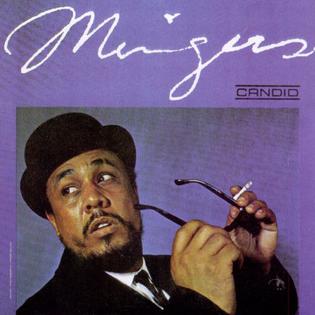
Mingus is an album by the jazz bassist and composer Charles Mingus. The album was recorded in October and November 1960 in New York and released in late 1961 on Nat Hentoff's Candid label.
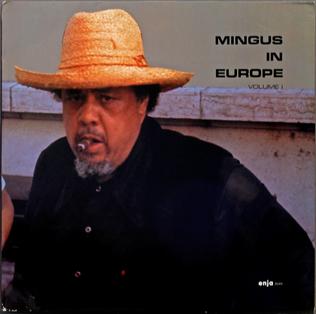
Mingus in Europe Volume I is a live album by the jazz bassist and composer Charles Mingus, recorded in 1964 in Stadthalle in Wuppertal, Germany and released on the Enja label in 1980.
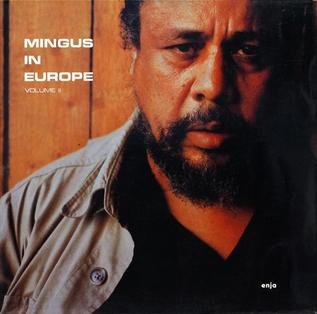
Mingus in Europe Volume II is a live album by the jazz bassist and composer Charles Mingus, recorded in 1964 in Germany and released on the Enja label in 1980.

Revenge! is a live album by the jazz bassist and composer Charles Mingus, recorded in 1964 in Paris and issued on many bootleg releases before being legitimately released on the Revenge label in 1996.

Pepper Adams Plays the Compositions of Charlie Mingus, is an album by baritone saxophonist Pepper Adams featuring Quintet and Octet performances of Charles Mingus' compositions which was recorded in 1963 and originally released on the Motown subsidiary label, Workshop Jazz.



















